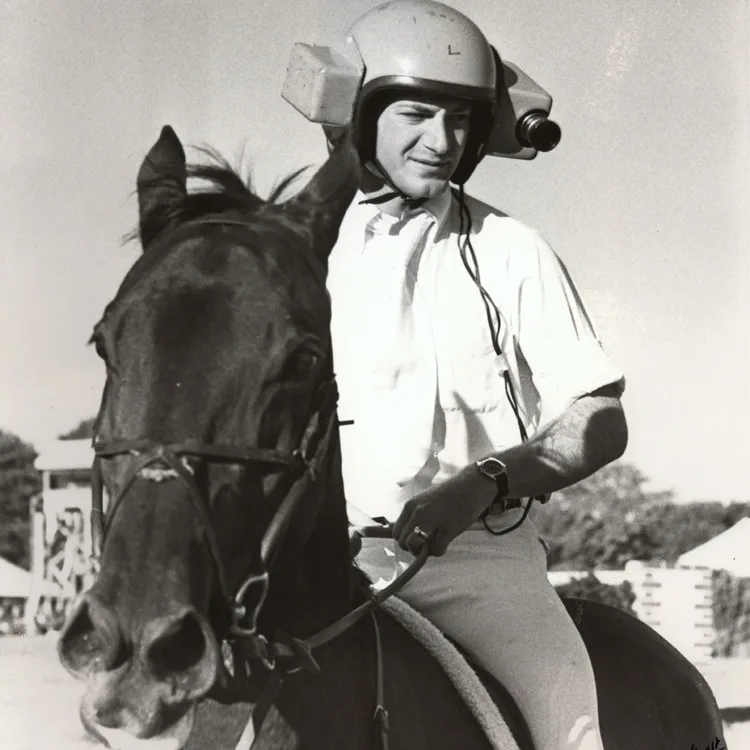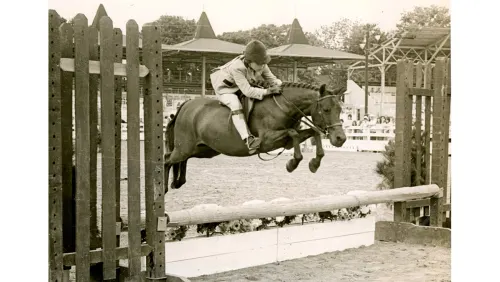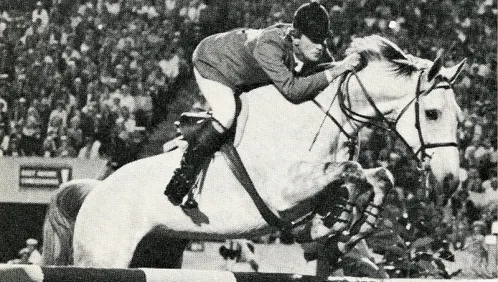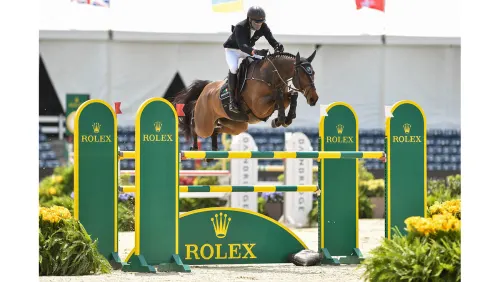Here at the Chronicle, we spend a lot of time digging through old issues to fact-check for stories—memory has a tendency to pad the placings of favorite horses—and to track down old photos and articles for various purposes. When George Morris calls the office asking for a photo of Peggy Augustus and Waiting Home to accompany his next column, I always volunteer for the task. Locating specific historical items is extraordinarily time consuming, not only because there are several decades that aren’t indexed, but also because it’s impossible not to be distracted by all the amazing letters stories, notes, photos, ads and editorials.
At one point while I was researching the 1970s for our 75th anniversary issue, I stopped interrupting my co-workers to show them treasures every three minutes, and started keeping a list of some of the things that caught my eye.
Here are some of my personal favorites that mostly stay on the lighter side of things. Enjoy!
Isn’t That Sweet!
How can’t you love something like this? Published Oct. 6, 1972
Dear Sir:
Below is a note that took a couple of 14-year-old girls time to compose, a long time.
We would really like very much for you to print it along with our picture of one of those loving dads who helps us so much. So many other kids feel the same way and we just want them to know. We also love your magazine.
Thanks so much,
Cris and Moose Garwood
Schofield Baracks, Hawaii
“Dear Parents:
This is a note of great appreciation to all those wonderful parents who stick with us bratty show kids through thick and thin, getting up at four in the morning for that long haul to that far away horse show that you insist on attending, also making sure the day before our clothes are neatly pressed and horses neatly braided.
We thank you with all our love!
Cris and Moose”
The Trials Of Being A Non-Horsey Bachelor In Middleburg
I’m assuming this is tongue and cheek, though the Chronicle, and the horse world in general, wasn’t exactly at the forefront of the feminist movement. This personal favorite was published Aug. 20, 1971.
Oh, I’m terribly tired of women who ride,
Of their prancing around with a masculine stride,
Of the skin on their faces like elephant’s knees
From the constant exposure to sun and to breeze.
And I’m sickened to death of the clothes that they wear,
Of the hideous hard hats regardless of hair,
Of the sag of their skirts and the bag of their breeches,
Of the knobby aspects their anatomy reaches.
I’m unable to listen to much of their talk,
It’s mostly a check, a canter, a walk.
If I try to discuss the day’s news or a game,
They tell me that Rosebud, poor darling, is lame.
But what really gags is to see them out dancing,
When they’re girded their loins to be really entrancing.
I’ll spare you the picture, they do all their able,
But the poor neuter darlings still smell of the stable.
-M.M.A.
ADVERTISEMENT
A Martingale Poem
Before the Chronicle Forums, we had the letters section of the magazine, and in the 1970s the so-called “martingale fracas” dominated. One reader quoted a poem she attributed to Piero Santini, neatly summed up the decade-long debate over the proper use of the standing martingale:
There are those who love the martingale
And those who loathe its use
Some seem to like it very tight
While others use it loose.
Whichever view the student shares,
The pros and cons aren’t few
One must admit their handiness
When we aren’t sure what to do.
The Horrors of the Horse Show Correspondent
OK, I did pass this editorial, published Aug. 21, 1970, around the office. Incidentally, author Michael Kelley, a regular correspondent for the Chronicle for many years and a member of the Genesee Valley Hunt (N.Y.), is a woman.
War correspondents are highly regarded among journalists because of the obvious dangers they face reporting the facts of organized murder. Police reporters, also, occasionally become involve din physical clashes, as do ordinary college newspaper writers. But the current horse owner population explosion has produced a new hero, the horse show correspondent.
The new hero faces scores of dangers, the athletic rider, jealous owners, enraged teenagers and well-read parents. Horse show results are a sure invitation for sudden death, as any error will bring a swift attack. Strangely enough it is the elementary classes, such as the lead line or the walk-trot events, that turn on the greatest wrath, especially if the eighth and ninth placing is reversed. In this case, nasty letters are written to bring about prompt correction.
War correspondents may inject a personal opinion i.e., the enemy used poor judgment when they bombed their won airfield. But not the horse show correspondent. He may never mention the fact that Mrs. Muttonfist riding Glorious Courage is a terrible rider; instead he chirps merrily about the horse’s brilliant pace.
A show reporter always carries a pair of rose-colored glasses and used them well for his job. Inefficient management, slow tedious judging or poor courses are seldom mentioned for fear of being labeled as prejudiced or part of a huge Communist plot to ban leisure time activities.
ADVERTISEMENT
Weather may be discussed, but is always qualified with some original remarks- “A heavy shower failed to dampen the spirits of” or “gale-like winds did little to blow away the enthusiasm of.” In short, nothing must mar the image of the horse show Johnnie or Sue.
Any spelling inaccuracies are much like the signing of a death warrant. The show secretary may forget the “e” on Sue Leadbottome’s name, or the announcer can mumble through John Sloshinger, but no error of any type may be made by the correspondent.
Any mistake in listing this championship or reserve is like stepping on a land mine. New horse owners are insanely jealous of their possessions; a printed error invites a public kiss of death.
Yet with all these emotional, mental and physical dangers, a small band of battle scarred show correspondents remain. Their copy is always acceptable to horse journals; after all, the letters of complaint and correction for the reading public do make for lively editorial reading. The exchange can go on for weeks!
-Michael Kelley
Want to see more jewels from the archives? Check out this summation of the 1970s, and lots more Throwback Thursday columns.















